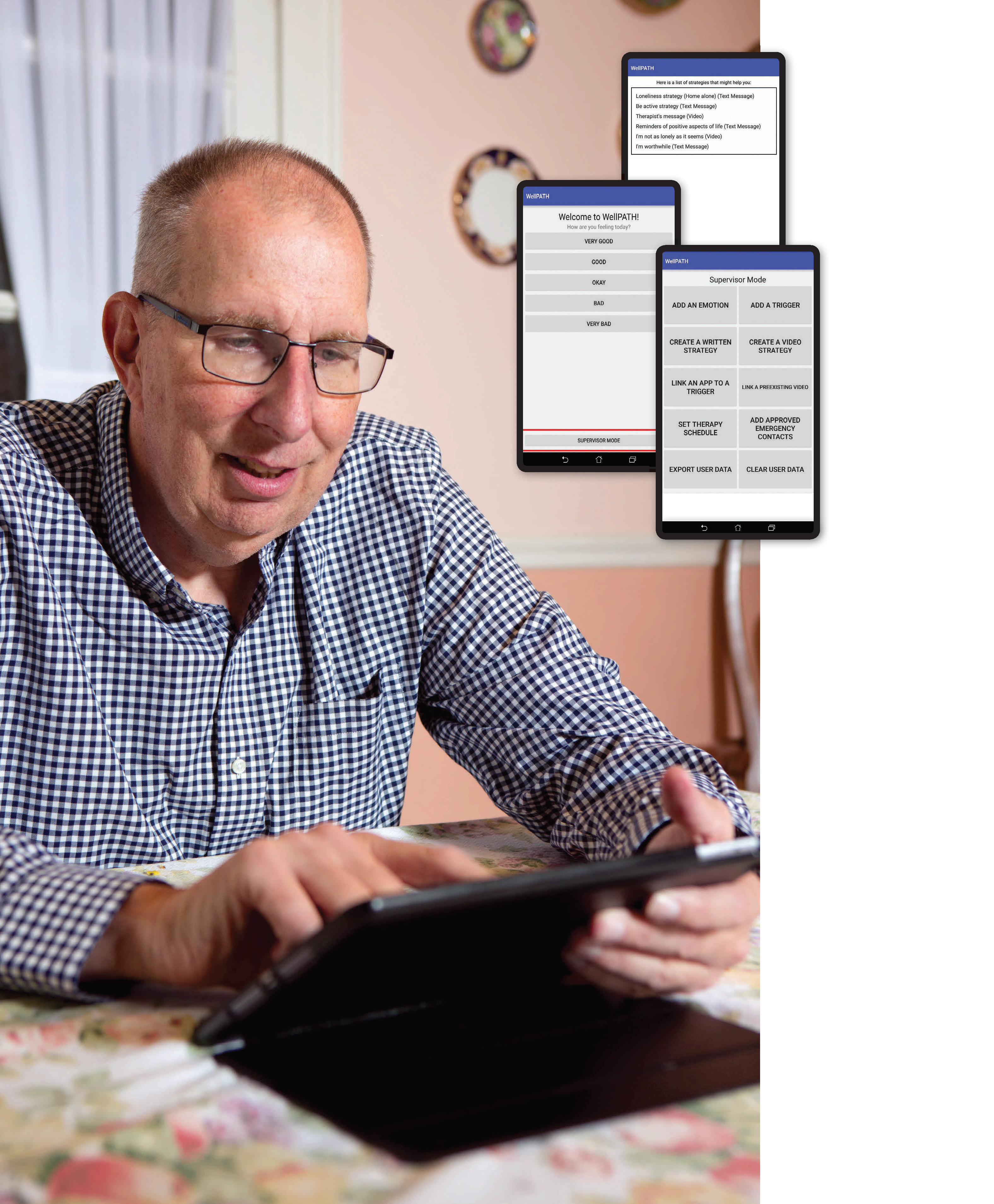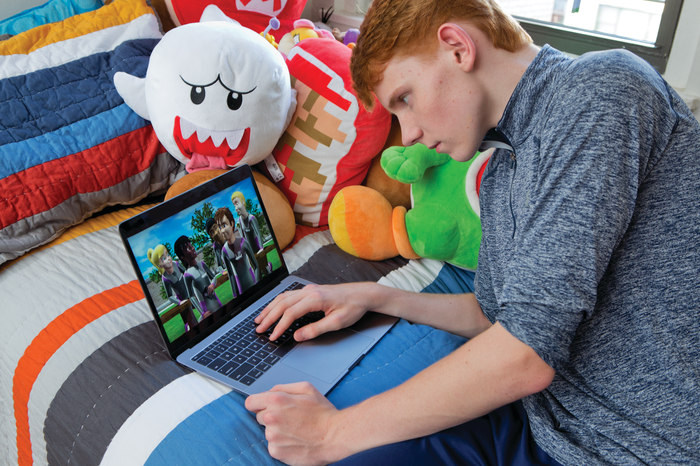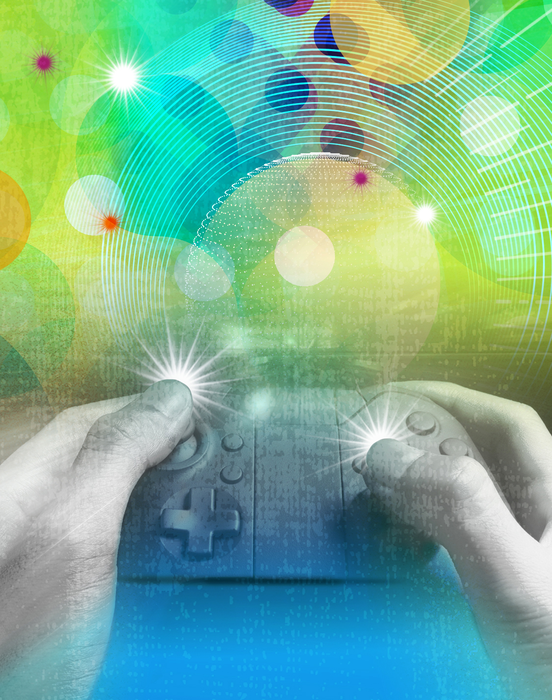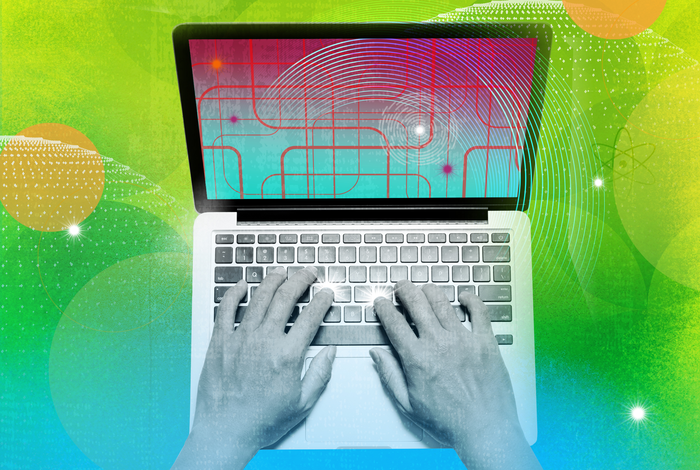By Amy Crawford
Illustrations by Stephanie Dalton Cowan
Photos by John Abbott
Tegan Lee always thought of himself as “a very systematic thinker,” the sort of person who solves problems quickly and efficiently. It’s a style that served him well through a long career as a project manager and consultant in the tech industry. But two years ago, when Lee was in his late 50s, a diagnosis of late-onset bipolar disorder forced him into early retirement—and upended his life. “I wouldn’t wish this on anybody,” says Lee. “I was very motivated to get better.”
Lee, who lives in suburban New York City, considered suicide. But he found a way through his mental health crisis as an inpatient at NewYork-Presbyterian Westchester Division, where he volunteered for a clinical trial involving a psychotherapy that utilizes a tablet-based app called WellPATH, which would help him identify and defuse the emotional triggers that led to his thoughts of self-harm. As lead researcher Dr. Dimitris Kiosses, associate professor of psychology in clinical psychiatry at Weill Cornell Medicine, notes, while talk therapy can help patients see and get past their triggers—in Lee’s case, for example, a feeling that his life was worthless often led to thoughts of suicide—outpatient appointments typically only take place once or twice a week. “What about the rest of the days, or during emotional crises?” Dr. Kiosses says. “That’s when patients need it the most.”

Online Aid: An app called WellPATH has helped Tegan Lee cope with bipolar disorder.
To Dr. Kiosses and his research collaborators, technology offered a potential solution. If a patient and their therapist could pre-load an app with positive messages—either text or video—and selected personalized coping strategies, they theorized, the patient could get help whenever they feared thoughts of suicide were on the horizon. “That approach worked spectacularly for me,” says Lee, who used the app as an outpatient for several months after he was released from the hospital (and still uses the strategies he learned then with his current therapist). “I’m not a geek, but I am a computer guy— and with apps, it’s not cumbersome like pencil and paper might be.” Where he might once have had to search through notes to help himself remember which emotional management strategies had worked before, now, he says, “I have my smartphone right there. The technology simplified everything.”
Technology is often blamed for worsening our mental health, whether through compulsive social media use or addictive video games. But Dr. Kiosses and his team are part of a growing number of mental health providers and researchers who see the potential for it to be a force for good. One market research report found that nearly half of healthcare consumers use mobile health (or “mHealth”) apps, and according to a recent World Health Organization survey there are now an estimated 350,000 available, more than a quarter of which focus on mental health. Some, like WellPATH, use emotion regulation techniques (also utilized in cognitive behavioral therapy) to help people manage anxiety or depression. Others offer a way to keep track of a user’s mood, or provide text-message contact with therapists who can respond in real time. While technology may never fully substitute for treatment by an in-person clinician, a new generation of evidence-based apps and computer programs—including several now in clinical trials at Weill Cornell Medicine—may improve access to care and expand the ability of therapists to help their patients outside the office. “Some people think it’s going to democratize mental healthcare, and certainly there is that potential,” says Dr. JoAnn Difede, a professor of psychology in psychiatry and director of the Program for Anxiety and Traumatic Stress Studies at Weill Cornell Medicine, who’s a pioneer in the use of virtual reality to treat post-traumatic stress disorder and a scientific advisory board member for Pear Therapeutics, which is developing prescription digital therapeutics to treat patients suffering from a range of serious diseases, including depression. “I think it’s also going to increase the efficiency of the treatment, in part by increasing patient motivation and engagement. This is a really exciting time for mental health, and it seems like the possibilities are almost limitless.”
A Tech-Oriented World

Virtual World: Manhattan teen Brad Lynch played the therapeutic video game Secret Agent Society to curb his social anxiety.
The explosion of mHealth apps and software comes at a time when patients are increasingly accustomed to living their lives through technology—especially young people like 15-year-old Manhattan resident Brad Lynch, who used a video game called Secret Agent Society to help him overcome paralyzing social anxiety. “The day before I started sixth grade, I was super nervous,” Brad remembers. “I had no real friends, and I struggled with talking to adults.” The game, in which a player acts out the role of a spy who learns to read people’s emotions and uses social skills to solve challenges, began as the doctoral project of Dr. Renae Beaumont, now an assistant professor of psychology in clinical psychiatry at Weill Cornell Medicine. Now produced by the nonprofit Social Skills Training Institute, the game offers a virtual world with risk-free opportunities to learn and practice. The format appeals to kids like Brad, who are often already fans of video games. “Unlike reading a book to learn these things, I wanted to play,” he says, explaining that the system of increasing challenges and rewards— an approach known as “gamification”—made the endeavor more fun. The game and accompanying group sessions with a therapist were so effective that by the end of eighth grade Brad had enough confidence to give a speech at his middle school graduation. “He was really struggling, and this video game gave him the motivation to try something new,” says Brad’s mother, Christine Lynch, noting proudly that her son’s speech received a standing ovation from his classmates. “The game and the class changed his life and our family’s lives.”
Brad’s outcome is consistent with the results of clinical trials that have demonstrated the game’s effectiveness at improving social skills and reducing social anxiety in children from eight to 12, including those on the autism spectrum, Dr. Beaumont says. The results have helped overcome initial skepticism from parents, who are often more likely to see video games as detrimental to their child’s social life than as a tool to improve it. “There is definitely a counterintuitive dimension to this,” acknowledges Dr. Beaumont, who is a founder of Secret Agent Society. “But my thinking is, let’s play to kids’ strengths and their interests. Gaming is very attractive to lots of kids in today’s society, so it seems like a natural platform to help them learn and apply the skills that they need to be successful in life.”

And therapeutic video games aren’t just for kids. Dr. Faith Gunning, associate professor of psychology in psychiatry, is currently conducting a clinical trial of up to 76 patients at Weill Cornell Medicine and the University of Washington to gauge the effectiveness of an iPad game for older adults with depression. It’s an intervention that she and her collaborators hope will alleviate their mood symptoms and lessen the cognitive weaknesses that can occur in some patients with depression. “We know that a subgroup of older individuals with depression has specific difficulty with executive function,” Dr. Gunning explains, referring to a set of cognitive processes that include paying attention, planning, using working memory and managing multiple tasks at the same time.
Created by a firm (unaffiliated with Weill Cornell Medicine) that bills itself as “a prescription digital medicine company,” the game asks participants to manipulate an iPad, using the accelerometer-equipped device like a steering wheel, to avoid obstacles such as walls and cliffs in a virtual environment. The game requires players to be aware of and react to different streams of information simultaneously, which provides a stimulating workout for their executive function. “It’s a fun and engaging game that looks like a video game, but it’s designed based on neuroscience principles,” Dr. Gunning says. She notes that the number of people assigned to play the game who stayed in the four-week study from beginning to end was close to 100 percent. “That’s frankly unheard of,” she says. “I’ve never seen this level of engagement with any intervention I’ve tried, which is one of the things that makes this promising.” It helps, she notes, that today’s older generation has become relatively adept with technology, to the point where a clinical intervention that looks like a video game can feel intuitive and natural. “We should be taking advantage of how integrated technology is into people’s lives,” Dr. Gunning says. “A lot of people are now more comfortable with that format than they might be in traditional therapy.”
A recent Pew survey found that 81 percent of Americans now have a smartphone, including 95 percent of people between the ages of 18 and 34. Mobile technology offers the potential to reach patients where they are—which is the idea behind a new smartphone-based cognitive behavioral therapy protocol for young adults with anxiety, co-developed by Dr. Avital Falk, an assistant professor of psychology in clinical psychiatry and director of the Pediatric OCD, Anxiety and Tic Disorders Program at Weill Cornell Medicine. The app, called Maya, is currently undergoing preliminary trials with a group of patients, and Dr. Falk and her colleagues hope to one day make it available free for anyone to download. (Its development has been facilitated by support from the Weill Cornell Children’s Health Council as well as the NewYork-Presbyterian Youth Anxiety Center.) It includes videos and interactive exercises that help the user develop skills to manage anxiety—for example, by recognizing and shifting disordered thinking. “We’re really excited about the possibility that we can increase access to care when people don’t have the option of seeing a therapist right away,” Dr. Falk says. “Also, anxiety sometimes gets in the way of people getting out and going to a therapist. This allows them to get over that initial hump in the comfort of their own homes.”
The Treatment Gap
Data from federal agencies show a clear need for better ways to help people access mental healthcare. According to the National Institute of Mental Health, about one in five Americans has a mental health condition—but the Department of Health and Human Services has found that about a third live in areas with a shortage of providers. Meanwhile, a National Council for Behavioral Health survey found that 29 percent of Americans wanted treatment for themselves or a loved one but did not seek it, in part because they weren’t sure how. “There are a number of barriers: lack of providers in different areas, costs, knowledge,” Dr. Falk says. “People don’t necessarily know what they’re even looking for.”
While Dr. Falk has high hopes for the ability of technology to reach those who might otherwise go without mental healthcare, she and her Weill Cornell Medicine colleagues caution against seeing it as a substitute. Market data indicates mHealth apps are popular, and studies of specific programs show promise (primarily for anxiety and depression), but there is still much research to be done into the format’s effectiveness, especially as a stand-alone intervention. And while psychiatrists and psychologists are working to ensure that their apps and games are backed by strong clinical evidence, some worry that quality may be left behind as the industry expands—especially since many apps are published by amateur or commercial developers without clinical experience, and very few apps are regulated by the FDA. “Our focus is on providing care that’s well-tested and validated, so that we know exactly what people are getting and that it will actually benefit them,” Dr. Falk says. “We don’t want people getting advice that may or may not be well suited to what they’re struggling with.” Dr. Gunning agrees, noting that companies seeking to take advantage of the current popularity of mental health technology may create apps that are not well-grounded in science. Still, she says, “I do think we have almost a crisis, from the standpoint of limited accessibility to mental healthcare. Figuring out how technology can help us close that gap is incredibly important, since we’re simply never going to have enough mental health providers to meet the needs of our population.”
Technology may also help expand the reach of clinicians who find themselves overstretched. According to one recent survey, three out of four physicians report using mHealth apps in their practice at least weekly (although there is no data about mental health apps specifically). The researchers behind Iris Ob Health Inc., a digital startup that spun out of Weill Cornell Medicine and won the $75,000 first prize in the 2019 Biomedical Business Plan Challenge, which is sponsored by Weill Cornell Medicine’s BioVenture eLab, hope that their project becomes one of them. The company’s co-founders are Dr. Alison Hermann, assistant professor of clinical psychiatry, and Dr. Jyotishman Pathak—the Frances and John L. Loeb Professor of Medical Informatics, chief of the division in the Department of Healthcare Policy and Research, and Iris’s CEO. They aim to take advantage of recent advances in artificial intelligence and big data to address a pressing clinical issue: while more than 1.5 million women suffer from depression or anxiety connected with pregnancy and childbirth, it can be difficult to know which mothers need help before their symptoms become severe. The digital health platform that Iris is developing can flag pregnant and new mothers whose self-reported symptoms and medical history indicate a higher risk of mental health issues. “Right now, the trend is for universal screening, and that burden is falling on the front-line providers like obstetricians,” explains Dr. Hermann, Iris’s chief medical officer. “But they really don’t have psychiatric training, other than the little bit that they learned during medical school.” Iris would help providers predict which patients are at highest risk for problems like postpartum depression, so they can refer them for preventive psychotherapy or schedule additional appointments after childbirth to check on their mental health.
Like many of the clinicians and researchers now boldly entering a new technological era, Dr. Hermann never imagined herself as a software developer. A specialist in mental health issues connected to the reproductive cycle, she still thinks of herself as someone whose skills lie in building connections with patients, and in understanding the interdependence of mind and body. “I’ve never taken a computer science course, and I’m not a techy person,” she says. “But there are so many new opportunities, whether in AI or digital health, that clinicians need to take advantage of. Certainly, we have to be sure that we use the technologies to help us, and not hinder us, in developing strong relationships between providers and patients. But I’m convinced that bringing these technologies into our clinical work really is the future.”
If you are thinking about suicide, please call the National Suicide Prevention Lifeline at 800-273-TALK (8255).
This story first appeared in Weill Cornell Medicine, Winter 2020

